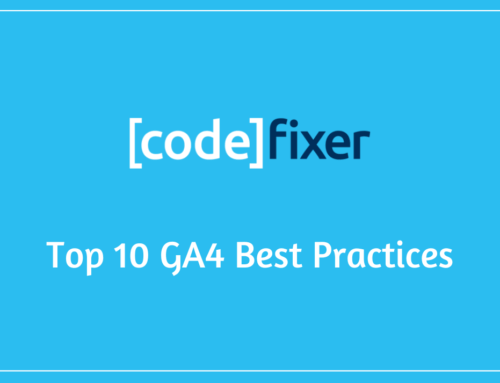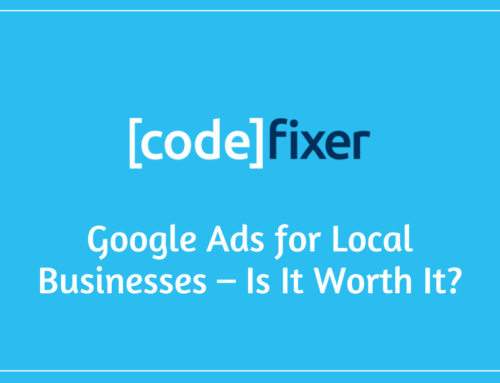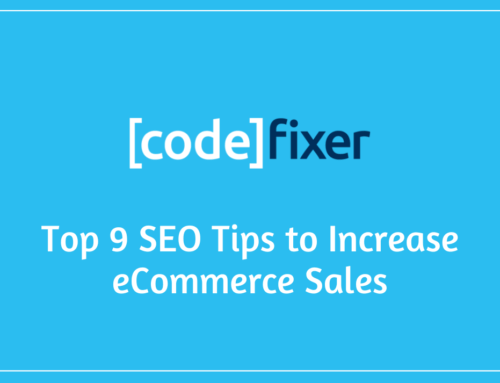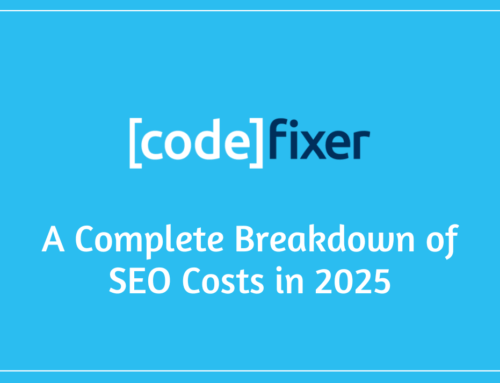Securing an SEO budget is key for long-term business growth, but getting C-level executives on board can be challenging. Often, they need clear data and a strong strategy to understand SEO’s value. So, how do you address their concerns?
Why SEO Needs a Dedicated Budget
Before addressing SEO challenges with your C-suite, it’s important to understand what an SEO budget covers and why it’s necessary.
An SEO budget is the portion of a company’s marketing spend specifically allocated to SEO activities. It covers the cost of SEO tools, including software like Screaming Frog and Ahrefs, as well as expertise and services such as keyword research, content development and technical optimisation.
If the ultimate goal of a business is to increase conversions or revenue from non-brand organic search sustainably, SEO budget allocation shouldn’t be underestimated.
Unlike other marketing expenses, SEO requires ongoing attention as it’s a constantly evolving industry with changes to best practices and regular algorithm updates. Plus, monitoring competitor performance and user behaviour enables your business to adapt and even surpass your competitors.
Therefore, SEO needs to be treated as a monthly expense to remain effective, helping you stay ahead and steadily increase organic traffic and leads.
Understanding C-Level SEO Budget Concerns
To secure an SEO budget, you need to understand the concerns and priorities of C-suite executives. They look at budget allocation across all departments through a strategic lens, focusing on how each investment contributes to overall business success.
By addressing the following questions, you can tailor your approach to effectively match their thinking and present a stronger case for investing in SEO.
What Factors Do C-Level Executives Consider When Allocating a Budget?
C-level executives make decisions based on high-level company objectives, prioritising investments that show measurable returns. They focus on how each budget allocation supports growth and profitability. With SEO, it can be difficult to showcase the typical ROI that they want to see, but it is still possible to translate key SEO metrics into clear, understandable data.
To secure an SEO budget, you need to demonstrate how SEO contributes to the business’s goals, such as increasing market share, improving customer acquisition or boosting overall revenue.
Do They Understand SEO And The Strategic Importance It Has Within Marketing?
Many C-level executives may not fully grasp the in-depth nature of SEO, such as the tools, expertise and technical skills required. They may see SEO as a complex, technical area, making them reluctant to approve a dedicated, realistic SEO budget.
Bridging this knowledge gap by showing how SEO complements other channels – like paid search, content marketing, and PR – helps them understand its strategic role. Doing so can help executives see SEO as a long-term investment that drives results across various parts of the business.
Can They See The Link Between SEO And Wider Business Goals?
Executives are primarily concerned with how investments contribute to key business objectives like revenue growth, lead generation and customer acquisition.
You can demonstrate its direct impact on the company’s bottom line by linking SEO efforts to measurable outcomes – like increased organic traffic, reduced customer acquisition costs, or stronger brand visibility. This helps make a compelling case for SEO budget allocation by demonstrating its ability to support broader business goals.
How to Secure SEO Budget from C-Level Executives
Securing a dedicated SEO budget requires more than just explaining the basics of SEO; it involves presenting a well-rounded case that directly ties SEO to business growth.
To convince C-level executives, you need to offer clear, data-driven solutions that demonstrate both the immediate and long-term value of investing in SEO. Here are some practical ways to help you build a compelling case.
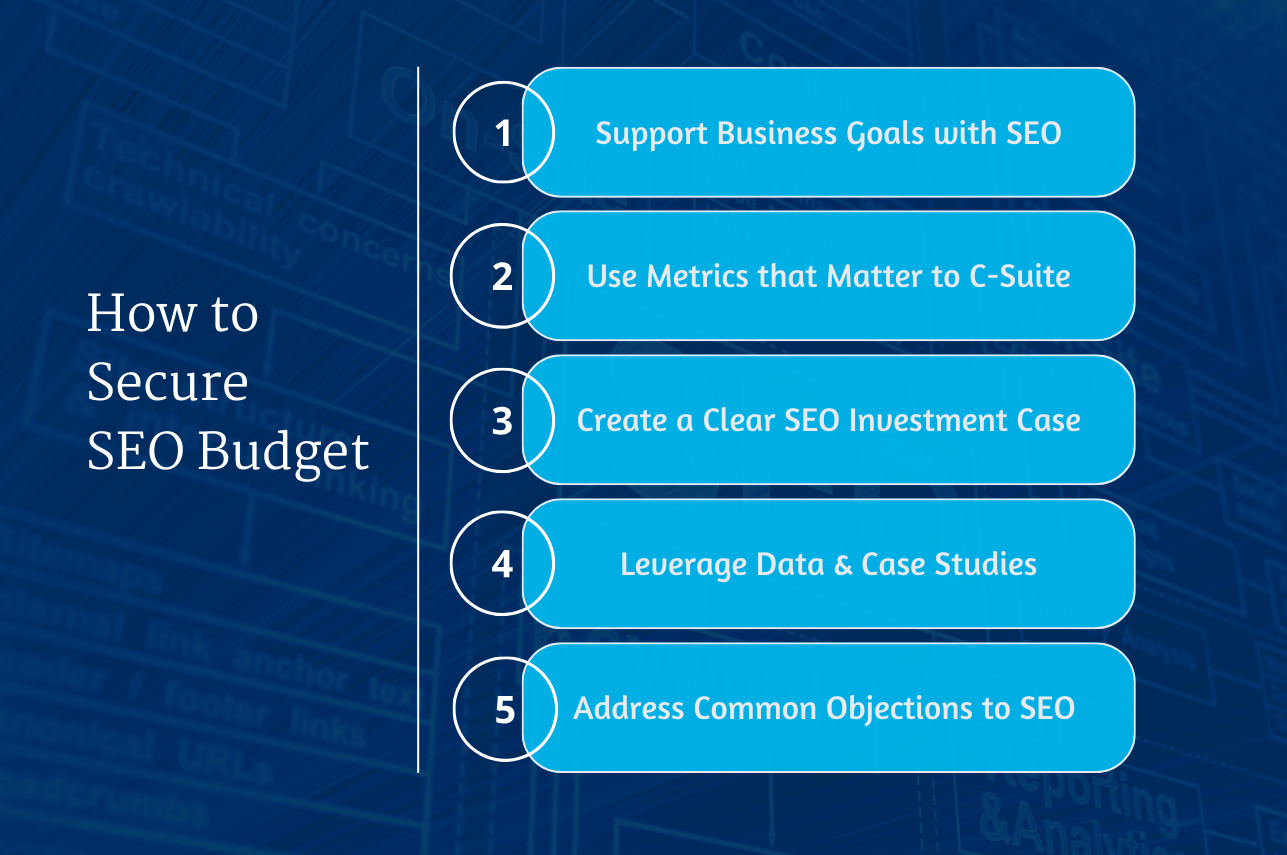
1. Support Business Goals with SEO
SEO should support key business objectives such as revenue growth, brand visibility and customer acquisition. You don’t need to go into the technical details of SEO when speaking to C-level executives; rather, you just need to focus on how it contributes to the company’s broader goals. For example:
⛔ Business Problem – Organic website traffic is low, and your company is overly reliant on paid advertising to drive website visits.
💡 SEO Solution – By optimising the website for high-intent keywords and improving content, SEO can increase organic traffic, reducing the need for costly paid campaigns.
📈 How This Supports Business Goals – This contributes to the company’s objective of reducing customer acquisition costs while growing brand visibility and revenue through sustainable channels.
Showing how SEO drives these important goals makes it easier to justify the SEO budget to C-level executives.
2. Use Metrics That Matter to the C-Suite
When presenting an SEO budget request, use metrics that resonate with C-level executives and show how SEO directly impacts the company’s bottom line. CMOs should first identify the KPIs that matter most to the business and clearly demonstrate how SEO can support those metrics, helping executives see the value of investing in SEO.
Here are some key metrics C-level Executives tend to care about:
- Revenue Growth: This is a primary focus for any business. SEO increases organic traffic, which drives more conversions, leading to sustainable revenue growth.
- Lead Generation: SEO targets high-intent keywords and attracts qualified leads with the goal of consistently filling the sales pipeline with potential customers.
- Return on Investment (ROI): Executives expect every investment to show clear returns. SEO offers long-term ROI through organic traffic growth and reduced spend on paid advertising.
- Customer Acquisition Cost (CAC): SEO can lower CAC by driving traffic organically, decreasing the reliance on expensive paid channels for customer acquisition.
- Customer Lifetime Value (CLTV): SEO helps attract and retain customers by providing relevant content that keeps them engaged, leading to increased CLTV.
- Market Share: Ranking higher in search results increases visibility and market presence, allowing the business to capture more of the market.
- Brand Awareness: SEO boosts online visibility, keeping the brand present when customers search for products or services, which builds brand awareness and authority within the industry
By focusing on these metrics, you can clearly link SEO’s value to the company’s strategic goals, making it easier to justify the SEO budget to C-level executives.
In our experience, providing a detailed monthly report that highlights key metrics tailored to each client’s needs (such as revenue growth for e-commerce businesses or lead generation for service-based companies) makes SEO efforts more relatable and understandable. This approach will help you demonstrate the direct impact of your work to your C-suite in a way that resonates with their business priorities.
3. Create a Clear SEO Investment Case
To secure C-level buy-in for SEO, it’s crucial to present a clear, data-driven action plan. This should highlight the budget requirements, your chosen SEO partner, the timeline for results and the long-term value SEO will bring to the business. Executives need to understand both the financial commitment and the return on investment (ROI).
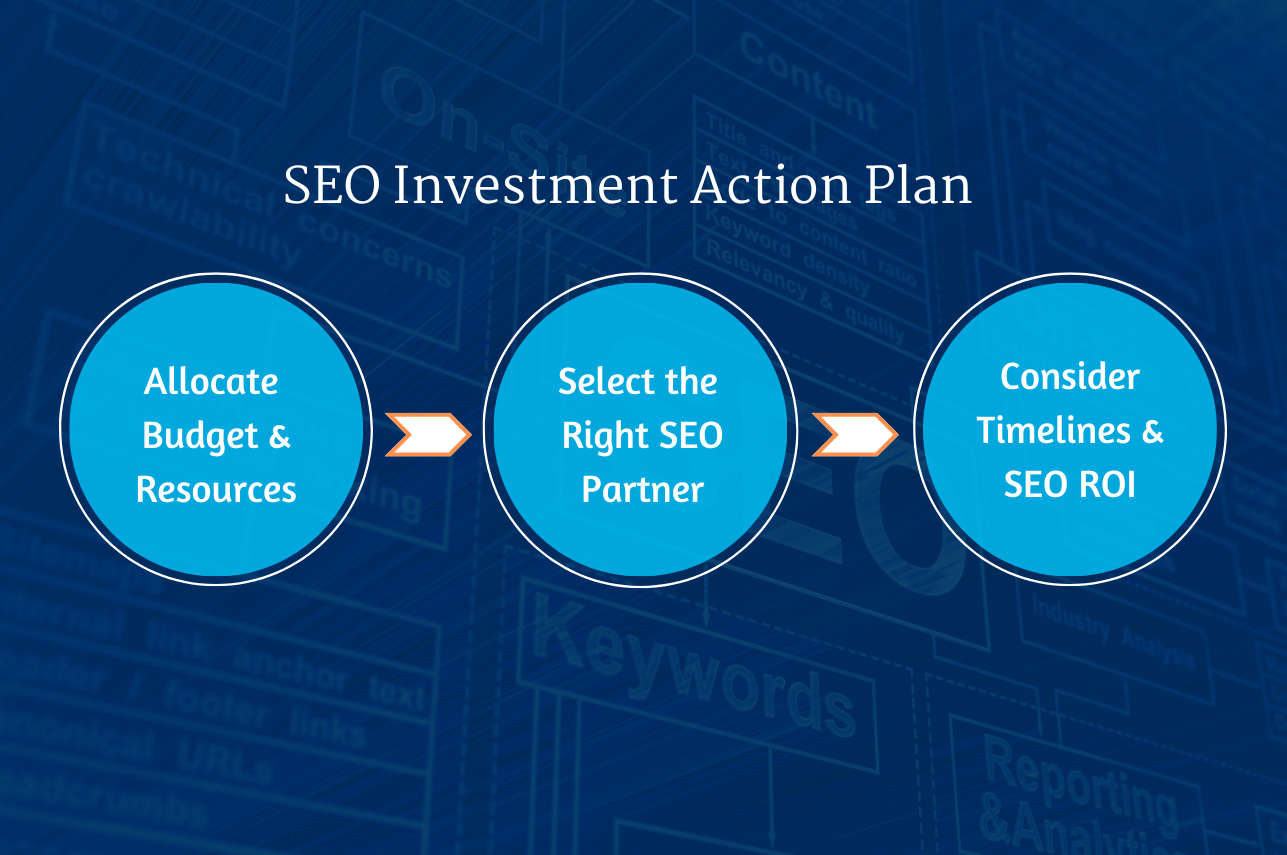
Budget and Resource Allocation
SEO requires a significant portion of your marketing budget to generate impactful results, especially if your business relies heavily on Organic Google Search or if you’d like to grow in this area. When allocating an SEO budget, think about all the areas this cost covers – everything from technical website optimisation, to content creation, to link-building and more.
Selecting the Right SEO Partner
Choosing a trusted SEO partner is key to making the most of your budget. A reliable SEO agency like ours will offer a structured process, managing everything from the initial audit to strategy and implementation. For example, our SEO process follows these key stages…
➡️ Discovery: We first seek to understand your business, competition and goals, to align SEO efforts with your overall strategy.
➡️ SEO Audit: Next comes a thorough SEO audit, to uncover technical website issues, keyword opportunities and improvement areas. Avoid agencies offering free SEO audits, or who skip this step altogether!
➡️ SEO Strategy & Implementation: Based on the audit, we provide a customised strategy with a clear monthly project plan for ongoing implementation.
Timelines and ROI
SEO is a long-term investment that requires at least 12 months for meaningful results. This timeline allows for gradual progress and provides year-on-year comparisons to demonstrate growth.
➡️ For lead generation websites this means tracking organic conversions (contact forms, calls, emails). For example, if SEO brings in 10 leads per month valued at £200 each, that’s £2,000 in monthly revenue or £24,000 annually. By integrating leads into your CRM, you can track conversion into sales, showcasing SEO’s business impact.
➡️ For e-commerce websites this means calculating ROI based on sales from organic traffic. If your average order value is £100 and SEO drives six sales per month, you’re generating £600 monthly or £7,200 annually. Growth in organic traffic directly translates into increased sales over time.
➡️ Cost savings also factor into ROI. If you’re spending £500 a month on paid ads for 50 clicks at £10 per click, ranking organically for the same keywords via SEO significantly reduces your cost per acquisition. SEO’s long-term value comes from lower costs and sustained traffic growth without continuous ad spending.
By demonstrating clear results like this, you’ll make a strong case for ongoing SEO investment. Highlighting both revenue generation and cost savings is key to convincing executives of SEO’s long-term benefits.
4. Leverage Data & Case Studies
Backing up your SEO budget request with concrete data and case studies is crucial for gaining executive approval. C-level executives need to see tangible proof that SEO delivers measurable results.
Use Historical SEO Data
If your business has previously invested in SEO and seen positive outcomes, this can be a powerful asset. From our experience, we’ve seen clients who complete a successful 12-month SEO campaign but then decide to pause – perhaps to explore other marketing areas or because a new manager wants to take a different approach. However, more often than not, they return when challenges arise, having experienced first-hand the reliable traffic that organic search provides.
Showcasing past SEO successes in increasing traffic, conversions, or revenue will remind executives of SEO’s value and build a strong case for continued investment, with the potential for even greater future success.
Find Relevant Case Studies
Case studies are powerful tools for showcasing SEO success, especially when they come from a similar industry. Highlight the results they achieved with SEO and use them to demonstrate what your business could accomplish.
Many of our clients say that seeing our SEO case studies tipped the scales in favour of SEO investment. If we can help a company in a similar sector achieve success, there’s no reason why the same results aren’t possible for you. Choosing an SEO agency with experience in your industry means they already understand the challenges and know what works.
It’s also worth looking into whether your competitors are investing in SEO – simply search on Google “[Competitor Name] SEO case study” and see what crops up. If they’re investing and are seeing growth, the risk of being left behind can be a strong motivator to secure your own SEO budget.
5. Address Common Objections to SEO
When pitching for an SEO budget, you’ll likely encounter objections from C-level executives. It’s important to anticipate these concerns and prepare compelling counterarguments that address their reservations head-on.
Here are a few common objections you may hear from the C-suite, with counter arguments to help you win your SEO budget case:
🚫 “SEO is too expensive”
✅ Counter argument: The cost of not investing in SEO can be far greater if competitors are using it to their advantage. Additionally, outsourcing SEO is often more cost-effective than building an in-house team, saving on overheads while still getting expert results.
🚫 “SEO takes too long to show results”
✅ Counter argument: SEO focuses on long-term, sustainable growth. By referring to long-term case studies, you can demonstrate how SEO delivers ongoing value by driving traffic for high-value searches, even months or years after the initial investment.
🚫 “You can’t accurately measure the ROI of SEO”
✅ Counter argument: SEO provides both short-term and long-term returns through measurable metrics like organic traffic, conversions, customer acquisition cost (CAC), and revenue. Additionally, SEO builds brand credibility, offering soft returns that compound over time.
🚫 “We already have a strong paid search strategy”
✅ Counter argument: Diversifying search marketing efforts is key to reducing risk. SEO complements paid ads, offering long-term visibility without the need for ongoing ad spend while also improving the performance of your paid campaigns by increasing overall search presence.
How an SEO Agency Can Maximise Your SEO Budget
An SEO agency like ours can help you maximise the return on your SEO budget by bringing expert knowledge, advanced tools and proven strategies to the table.
Our team understands the complexities of SEO, from technical optimisation to content strategy, and uses this expertise to prioritise efforts that yield the highest impact.
By outsourcing to an agency, you avoid the costs of maintaining an in-house SEO team while still gaining access to cutting-edge tools and industry insights. We also continually adapt your strategy based on performance data, ensuring that your SEO investment is always optimised for the best results.
And in our experience, it works!

Having Trouble Securing C-Suite Buy-In? Let Us Help
If you’re looking for further advice on how to present the value of SEO to your C-level executives effectively, or if you’re interested in our SEO services, our team is here to help. We can provide personalised guidance and strategies to help you secure the SEO budget you need to drive business growth. Contact us today to explore how we can support your SEO efforts and maximise your ROI.


